|
|
|
Sort Order |
|
|
|
Items / Page
|
|
|
|
|
|
|
| Srl | Item |
| 1 |
ID:
101380
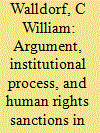

|
|
|
|
|
| Publication |
2010.
|
| Summary/Abstract |
When do humanitarian norms lead great powers, especially democracies, to impose sanctions against strategic partners and allies? I argue that answering more specific questions like this in space and time requires constructivists to focus greater attention on institutional and ideational process. Agents are central to policy change. But the ideational and institutional context in which agents build arguments determines when this change is more or less likely. In this vein, I argue that three factors in liberal states - legislatures, the nature of activist pressure, and strategic ideas - explain when humanitarian norms produce sanctions. I demonstrate the argument through a study of US Cold War relations with South Africa, Turkey, and Greece. Among other contributions, this article demonstrates how attention to process can extend the constructivist agenda into a series of new empirical domains and open avenues for contributions to important policy debates.
|
|
|
|
|
|
|
|
|
|
|
|
|
|
|
|
| 2 |
ID:
188744
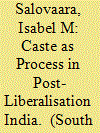

|
|
|
|
|
| Summary/Abstract |
The task of recent scholarship on India’s post-liberalisation period has been, in part, a re-casteing: a deliberate investigation of the ways in which historically embedded hierarchical divisions are continually reworked and thereby reinvigorated. Amid contemporary debates over the forms, sites and effects of caste and caste discrimination, this article identifies a shift in critical scholarship towards understandings of caste as process. Processual readings of caste within market- and merit-based institutions productively reframe caste in India from a ‘relic’ undergoing erosion to an accretion of new layers and logics upon older principles of innate human value.
|
|
|
|
|
|
|
|
|
|
|
|
|
|
|
|
| 3 |
ID:
083437
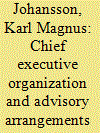

|
|
|
|
|
| Publication |
2008.
|
| Summary/Abstract |
As prime ministers are drawn into international relations and the foreign policy process, they are in need of advisory structures for foreign affairs in their offices. This article examines the system and the role of foreign affairs advisers to the Prime Minister (PM), the chief executive, in Sweden. The article centres on the organization for foreign affairs, in general terms of institutional and staffing arrangements, and on leader-adviser relationships. As the right hand of the PM, inner circle advisers in foreign affairs have a direct role in overseeing foreign policy on the key issues and do more than just serve in an advisory capacity by being operative in diplomacy and in policy coordination. These advisers can therefore wield influence on policy and the government based on their own expertise and position at the centre of power and at the frontier between the chief executive and the outside world
|
|
|
|
|
|
|
|
|
|
|
|
|
|
|
|
| 4 |
ID:
124820
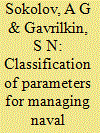

|
|
|
|
|
| Publication |
2013.
|
| Summary/Abstract |
The authors examine management of naval weapons development, put forth a decision-making model, lay out requirements to parameters for managing naval weapons development, suggest a classification of the system of parameters to manage naval weapons development, and offer recommendations for its employment.
|
|
|
|
|
|
|
|
|
|
|
|
|
|
|
|
| 5 |
ID:
124072
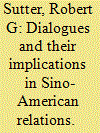

|
|
|
|
|
| Publication |
2013.
|
| Summary/Abstract |
This article briefly reviews the role exchanges and dialogues have played in U.S.-China relations since President Nixon's visit to China in 1972, and examines in more detail the process, significance and outlook of recent dialogues. The overall record of dialogues shows that they are important instruments in the policy "tool kit" of each side to deal with salient areas of common interests and disagreement that have broadened in scope as a result of China's rising international importance and the increasing salience of an ever wider range of issues in U.S.-Chinese relations in the 21st century. Both sides view these policy instruments positively; they serve as shock absorbers in periods of difficulty, provide the basis for actual or potential channels of informal communication in times of crisis, and promote efforts to broaden common ground in U.S.-Chinese relations. The checkered record of military exchanges is among the array of evidence showing the reality that dialogues are subservient to the respective interests of the leaders on either side. Dialogues are instruments of improved relations but they do not compel improvement, which at bottom is decided by policy elites in Beijing and Washington. After forty years of efforts to normalize U.S.-China relations, those elites cooperate closely on a wide range of issues but also reflect wariness toward one another that underlines important diverging interests and differences dividing the two powers.
|
|
|
|
|
|
|
|
|
|
|
|
|
|
|
|
| 6 |
ID:
087304
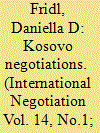

|
|
|
|
|
| Publication |
2009.
|
| Summary/Abstract |
Why do negotiations fail, how do we explain this failure through negotiations theory and what lessons can we draw for the future? What is the role of the mediator and to what extent do a mediator's values and interests affect the outcome of the negotiations? These questions are analyzed and answered through a discussion of the Kosovo negotiations and theoretical concepts of power imbalance, mediator's formula, trust, interests and perceptions. The analysis evaluates why the mediation efforts failed to produce a mutually acceptable agreement.
|
|
|
|
|
|
|
|
|
|
|
|
|
|
|
|
| 7 |
ID:
098445
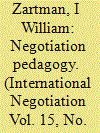

|
|
|
|
|
| Publication |
2010.
|
| Summary/Abstract |
Negotiation is less taught than might be expected in International Relations (IR) programs. Yet an upper-level university course is needed to address three audiences: future citizens, diplomats, and scholars. Since there is no single theory of negotiations, such a course needs to address the various conceptual approaches, grouped as Behavioral, Processual, Integrative, Structural, and Strategic. Conceptual presentations need to be supplemented with practitioners' testimonies, simulations, and case studies, the latter using participants' accounts as well as analyses. Games and a sample syllabus are presented.
|
|
|
|
|
|
|
|
|
|
|
|
|
|
|
|
| 8 |
ID:
148541
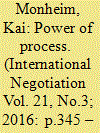

|
|
|
|
|
| Summary/Abstract |
Management of a multilateral negotiation has frequently played a crucial role in developing global regimes but is often ignored in International Relations theory. The long-awaited UN climate summit in Copenhagen, for example, broke down in 2009 but negotiations reached agreement one year later in Cancún. This article argues that power and interests remained largely constant between Copenhagen and Cancún, and that significantly altered negotiation management by the host government and the UN explains much of the difference. An analytical framework is presented to address whether and how the management of a multilateral negotiation by the organizers increases or decreases the probability of agreement. The empirical focus is on the Danish and Mexican Presidencies of climate negotiations, with extensive evidence from participant observation and 55 interviews with senior negotiators, high-level UN officials, and lead organizers. The argument adds to the scholarship on regime development by complementing structural with process analysis.
|
|
|
|
|
|
|
|
|
|
|
|
|
|
|
|
| 9 |
ID:
140396
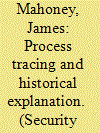

|
|
|
|
|
| Summary/Abstract |
This article offers a state of the art of methodological writings on process tracing. Its goal is to encourage the more self-conscious and transparent use of this method in security studies. The article considers process tracing for both theory testing and theory development. First, with theory testing, the article discusses the logic of historical explanation and the use of sequential analysis. It then focuses attention on two kinds of process-tracing tests: hoop tests and smoking gun tests. The article explores the mechanics through which these tests allow investigators to pass judgment on hypotheses. Second, with theory development, the article examines the use of counterfactual analysis and inductive discovery in the process of novel hypothesis formulation. The article shows how process-tracing researchers use event analysis to formulate original explanations of specific outcomes in particular cases.
|
|
|
|
|
|
|
|
|
|
|
|
|
|
|
|
| 10 |
ID:
140397
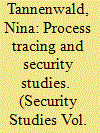

|
|
|
|
|
| Summary/Abstract |
Process tracing is used widely in security studies to advance all kinds of arguments. When, if ever, is it capable of “resolving” anything? Does the outcome of debates hinge on “good” or “bad” process tracing? In short, does process tracing lead to superior scholarly work? How would we know? This essay considers how we can judge whether some process tracing claims are more convincing than others, drawing on the competing process tracing-based claims of alternative explanations for the end of the Cold War. It argues that for process tracing to contribute to the resolution of debates, scholars will need to agree on what constitutes a key test of their explanations.
|
|
|
|
|
|
|
|
|
|
|
|
|
|
|
|
| 11 |
ID:
151616
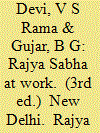

|
|
|
|
|
| Edition |
3rd ed.
|
| Publication |
New Delhi, Rajya Sabha, 2017.
|
| Description |
xlii, 1094p.hbk
|
| Summary/Abstract |
Editor: Shumsher K Sheriff
|
|
|
|
|
|
|
|
|
|
|
|
Copies: C:1/I:0,R:0,Q:0
Circulation
| Accession# | Call# | Current Location | Status | Policy | Location |
| 058956 | 324.220954/DEV 058956 | Main | On Shelf | General | |
|
|
|
|
| 12 |
ID:
167450
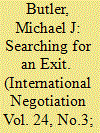

|
|
|
|
|
| Summary/Abstract |
By virtue of their defining criteria, international crises would seem unlikely candidates for conflict management and resolution. However, negotiations among crisis protagonists are not uncommon. Such behavior may reflect a desire to ‘exit’ the crisis dynamic. This article takes up the question of when and in what circumstances actors engaged in crisis situations turn to negotiation. Through an empirical analysis of over 1000 cases of foreign policy crises occurring between 1918 and 2015, this research examines a set of potential contextual, processual and structural correlates of crisis negotiation. The results of this analysis indicate that negotiation is less likely to occur in complex, high stakes, and especially violent crises, suggesting that negotiation is an unlikely and perhaps ill-suited response to more intense and severe crises.
|
|
|
|
|
|
|
|
|
|
|
|
|
|
|
|
| 13 |
ID:
182448
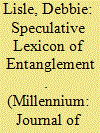

|
|
|
|
|
| Summary/Abstract |
This intervention offers a speculative lexicon to help students and scholars of global politics think critically and creatively about entanglement. It is neither definitive nor complete, but instead offers some possible points of entry into a contested field. It mobilises two particular claims: (1) that entanglement always involves both human and non-human entities; and (2) that entanglement is always emergent and in process. As a whole, this speculative lexicon is intended to help us sense the moment when entanglements intensify in ways that render them stable; attune to these durabilities in order to analyse their constitutive logics of inclusion/exclusion; acknowledge our own irrevocable entanglement in these logics; care for those bodies, lifeworlds, species and habitats that are targeted or abandoned by such logics; and craft mutual projects to disrupt, disaggregate and re-route these logics. Because entanglements are always emerging, dissipating and reconvening, the practice of navigating this open terrain is disorienting and often frustrating. We may desire a final destination where entanglements solidify and horizons magically appear, but giving in to that desire reproduces the violence of enclosure. This lexicon is offered as a way to keep the political terrain of entanglement open so we can collectively ensure that contestation remains a possibility.
|
|
|
|
|
|
|
|
|
|
|
|
|
|
|
|
| 14 |
ID:
116594
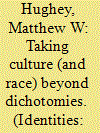

|
|
|
|
|
| Publication |
2012.
|
| Summary/Abstract |
Gans' (2012; Against culture versus structure. Identities: Global Studies in Culture and Power, 19 (2), 125-134) indictment of cultural sociology (CS) and his anointment of structural sociology would have us believe the two are incommensurate paradigms. I do not agree. I deconstruct this binary with theory and empiricism from the intersection of CS and the sociology of race and ethnicity (SRE). First, I redefine the project of CS, contra Gans' interpretation. Second, I refute Gans' assumption that 'CS is not much interested in cultural processes' by demonstrating how CS is concerned with the process and action of the material and symbolic aspects of social life. Third, I examine why well-placed trepidation over 'culture of poverty'-style explanations may influence a negative view of CS/SRE. Fourth, I map advances birthed from the CS/SRE connection that contest Gans' assertion that 'CS has not paid much attention to policy'. And fifth, I show how CS avoids tautological arguments in which culture would be 'its own cause'.
|
|
|
|
|
|
|
|
|
|
|
|
|
|
|
|
| 15 |
ID:
182425
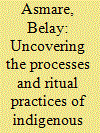

|
|
|
|
|
| Summary/Abstract |
Despite the availability of numerous studies on the issue of indigenous conflict resolution mechanisms, the process and ritual practices have not been explored in detail. Thus, the objective of this study is to examine the process and ritual practices during conflict resolution by shimgelina. To achieve these objectives, the study involved fourteen purposely selected shimageles and five conflicting parties for in-depth interviews, and three key informants. Personal observation and document reviews were used to collect data. In addition, one Focus Group Discussion, containing seven Idir leaders, was held to generate rich data about the issue. Thematic categorisation and analysis were used to examine the collected data. This study reveals that shimageles are employing a series of processes of conflict resolution with different ritual practices. Furthermore, this study argues that each ritual practice has its own importance in the process of conflict resolution. Despite the existence of different rituals that are important for conflict resolution and transformation, the shimageles and conflicting parties have fewer adherences to those ritual practices. Therefore, the study recommends that unless the rituals which are important for conflict resolution are strictly followed, the capacity of the shimageles to perform their conflict resolution role is undermined and remains elusive.
|
|
|
|
|
|
|
|
|
|
|
|
|
|
|
|
| 16 |
ID:
092040
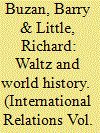

|
|
|
|
|
| Publication |
2009.
|
| Summary/Abstract |
This article provides a critique of Waltz's work from the perspective of world history. It shows how Waltz's commitment to a highly parsimonious theoretical approach paradoxically both sets up the possibility of his theory being universally applicable, and undermines its prospects as a viable approach to understanding world history. Using the key concepts from Waltz's work - units, systems, structure, process - we show the detailed grounds on which his theory fails to apply to such large swathes of time and place, so that its claims to universality fall, even though it can usefully be applied to some times and places. We also show its shortcomings in relation to the essential historical task of periodization. We argue that international relations needs to engage more with world history, and that the task of doing so will fall to approaches other than Waltz's.
|
|
|
|
|
|
|
|
|
|
|
|
|
|
|
|
| 17 |
ID:
159930
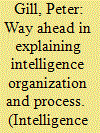

|
|
|
|
|
| Summary/Abstract |
This article considers the state of play with respect to modelling and explaining intelligence. First, there are some brief comments on the issue of theory itself; second, there is a more detailed consideration of the key elements of the information and power processes which constitute ‘intelligence’ and, third, it examines the main variables of regime, strategy and technology that must be considered in explaining the nature of intelligence systems. Finally, some implications for future research are considered
|
|
|
|
|
|
|
|
|
|
|
|
|
|
|
|
|
|
|
|
|